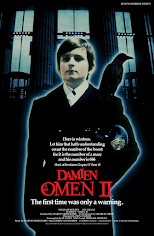Supernatural horror, probably the purest form of horror, was the overriding theme this week. . .
1. The Innocents (1961)
A fantastic adaptation of Henry James' "The Turn of the Screw", The Innocents is able to maintain the novella's sense of ambiguity while perfectly translating its chilling atmosphere to the screen. Deborah Kerr carries the film as the harried but steadfast nanny and her young co-stars, Martin Stephens and Pamela Franklin, impress as her two youthful charges. Not to be overlooked is Megs Jenkins, who imbues the film with some badly needed warmth and humanity as Mrs. Grose. Freddie Francis' deep focus cinematography is fantastic and greatly contributes to the film's eerie, unsettling atmosphere as does Jim Clark's unusual editing. It's a great film.
Score: 10/10
2. The Omen (1976)I decided to re-watch this (minor?) classic in memory of the lately deceased Richard Donner (RIP) though I had previously reviewed it for Shocktober in 2018. It still holds up and actually improved on a second viewing. By keeping us in the dark about Damien's true nature for much of the film, it is able to build up a real sense of mystery around him. We, like Gregory Peck's skeptical Robert Thorn, only gradually come to accept the terrible truth. Despite its occasional goofiness (the deaths can be hilariously over-the-top) Donner maintains a remarkable sense of tension throughout the film and the suspense builds and builds until the moment when Thorn drags his protesting son to the altar, fully intending to slay him. Though we, like Thorn, are fully convinced of Damien's diabolical nature by this point we can't help but sympathize when he looks at this seemingly innocent child and proclaims "God help me!"
Score: 8/10
3. Damien: Omen II (1978)
A truly lame, and completely unnecessary, sequel. The first Omen film worked because of the sense of mystery surrounding Damien. This is totally lacking here. Since we know from the start that he is the Antichrist we are left waiting around for the other characters to figure this out and it is a remarkably dull experience. William Holden and Lee Grant are largely wasted in their thankless roles as Damien's new guardians. Jonathan Scott-Taylor has at least a little more to do as a grown up Damien who, interestingly, is unaware of his own demonic nature but his transition from unassuming teenage boy to unfeeling anti-Christ is so quick as to be practically non-existent.
Score: 5/10
4. Poltergeist (1982)The film that defined the modern haunted house movie, Poltergeist manages to keep the story focused on the plight of its beleaguered family amid all the wacky supernatural high jinks. As in E.T. (often cited as a kind of companion piece) where Spielberg (the producer and possibly co-director for this film) seemed to almost uncannily tap in to a child's sense of wonder, this film taps into childhood fears. Indeed, the line separating the two becomes increasingly blurred in both films. It's not a perfect film. Some of the effects hold up better then others and it's portrayal of the supernatural is a bit muddled at times. For the most part, however, Poltergeist remains an effective piece of horror film-making, thanks to strong direction from Tobe Hooper (and quite possibly Spielberg as well) and an, as always, terrific score from Jerry Goldsmith.
Score: 9/10
5. The Conjuring: The Devil Made Me Do It (2021)The third entry is the Conjuring series is a distinct step down from its predecessors. This may be due in part to the absence of director James Wan, whose tight direction was so crucial to the success of the first two films. Another problem is that the stakes have been appreciably lowered here, with the threat coming not from a demon but a completely human demon-worshiper, who seeks to manipulate others not through possession but witchcraft. The film simply fails to conjure up (get it) the scares of its predecessors. This is not to say that The Devil Made Me Do It is a bad film, far from it. Patrick Wilson and Vera Farmiga continue to carry the series on their shoulders as paranormal investigators and authors Ed and Lorraine Warren and the films' unambiguous portrayal of demonic evil, and the power of the Church to combat it, is more welcome now then ever.
Score: 8/10
6. I Married a Witch (1942)
A welcome break from all the violence and terror, I Married a Witch makes for ideal light-hearted October viewing. Veronica Lake makes for a delightfully eccentric foil for Fredric March's befuddled gubernatorial candidate and (despite the fact that the two actors did not get along behind the scenes) they have wonderful chemistry together. The film's portrayal of witchcraft, though tinged with irony, is refreshingly wholesome by today's standards. Both Jennifer (Lake) and her father (Cecil Kellaway) are shown to be unambiguously wicked ("'Twill be sweet to plague the human race again" says Jennifer) prior to the former's reform and subsequent abandonment of her witchcraft. The script Robert Pirosh and Marc Connelly has all the wit and absurdity one comes to expect from a screwball comedy of this era and director René Clair keeps the film moving at a good clip.
Score: 9/10
7. The Sixth Sense (1999)Say what you will about M. Night Shyamalan, The Sixth Sense is still an absolute masterpiece. I honestly marvel at the films economy. Though deliberately paced (the first ghost does not appear until nearly the halfway mark) the film is also remarkably short and not a minute of screen-time is wasted. Shyamalan's ability to coax amazing performances, both from veteran actors and, especially, newcomers, is also incredible. There is a naturalistic quality to his best films that helps to ground them despite their heightened stories. He is greatly aided here by Tak Fujimoto's fluid, uneasy camerawork and James Newton Howard's subtle, emotional score. If you haven't watched it recently (or perhaps have never seen it) do yourself a favor and check it out.
Score: 10/10
Next week Hammer!






















